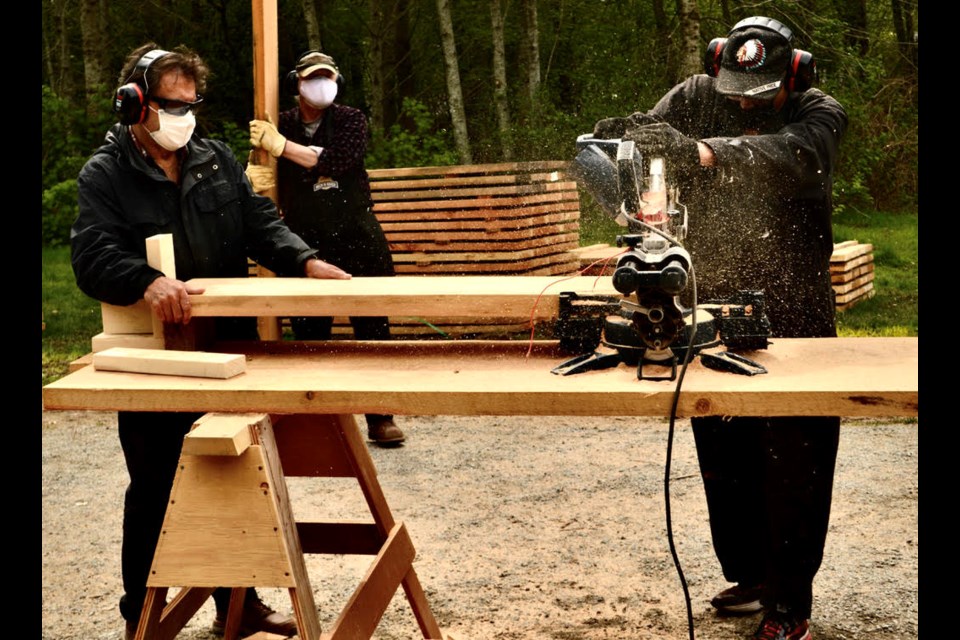The philosophy behind the Men’s Shed movement, which began in Australia in 1998, is that older males in our culture, particularly, do better dealing with life’s problems “shoulder to shoulder” with other men rather than face to face.
Men’s Sheds are community-based, non-profit organizations for older men. While every Men’s Shed is a little bit different, members typically work on meaningful projects in the company of other men. The idea is to foster the well-being and health of members.
The Squamish Men’s Shed, which formed in 2016, is set to host the first provincial Men’s Sheds Association (MSABC) conference from Oct. 26 to 27.
The keynote speaker will be Australian professor Barry Golding, who authored The Men Shed Movement — the company of men, and more recently a second book, Shoulder to Shoulder: Broadening the Men’s Shed Movement.
The movement is growing, and one of the objectives of the conference is to discuss how to best establish more sheds and support existing ones, according to Robert Goluch, president of the Squamish Men’s Shed and vice-president of MSABC.
About 70 Shed members from across B.C. will attend in-person, and the conference will be live-streamed to about 40 Sheds across Canada. Of the 18 existing and prospective sheds set to participate, will be — among others — Fraser Lake, Coquitlam, Vernon, Pemberton, Kelowna, and Prince George.
The latest COVID-19 protocols will be in place, including the requirement of vaccine passports at the venue, Executive Suites Hotel & Resort.
Goluch told The Chief that with a population of about 1,000 men in Squamish who are 65 or older, according to the 2016 census, the Men’s Shed fills a real need both for men to belong and to help their community.
Members of the Squamish Men’s Shed contributed about 3,500 volunteer hours to community projects, Goluch said.
There were about 160 visits by school-aged kids to the Squamish Shed, during which the youngsters learned woodworking skills.
The 17 Squamish members also collaborated with Don Ross Middle School students to build 34 classroom umbrella holders. Local Men’s Shed members also built 100 garden planters in a project with the Squamish Climate Action Network (CAN).
The organization is progressive and welcoming, Goluch said.
With the organization currently based in a literal shed at The Cedars set to move into a bigger, 2,000 square foot space at the under-construction Westwinds in February, the hope is the group will gain more members and be able to help out even more in the community.
“We are all looking forward to that, enormously,” Goluch said.
Globally, there are currently 3,000 Men’s Sheds in 10 countries. In Canada, the first Shed was established in Winnipeg in 2011.
In B.C., there are 14 Men’s Sheds with about 400 members, total.
Older men face isolation, loneliness and have a high rate of suicide, Goluch noted.
Older males die by suicide more often than any other group, according to Statistics Canada.
With Boomers all moving into the upper age groups, the Canadian Coalition for Seniors’ Mental Health is sounding the alarm that suicides may increase.
“There are very few men’s programs — programs just for men,” Goluch said. “Men’s Shed is, in fact, quite a realistic response to that kind of challenge. We provide both health literacy, and we promote health practices. People, when they do the projects together, they socialize and not only that they do a lot of good for the community.
The Squamish conference is supported primarily by funding from the United Way of BC.
(The Squamish Chief staff will also be presenting at the conference about media relations.)
Find out more about the Squamish Men’s Shed at squamishmensshed.ca.




